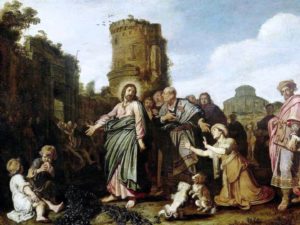Thoughts on Sunday’s Lessons for Sept. 9, 2018
First Reading (Track One): Proverbs 22:1-2, 8-9, 22-23
This Sunday we turn to the book of Proverbs, another work of wisdom literature that, like the Song of Solomon that we heard last week, was thought in older times to have been written by King Solomon himself. Many of its simple, timeless aphorisms might remind us of such modern works as Benjamin Franklin or the Old Farmer’s Almanac, and much of its wisdom seems as applicable now as it did 2,500 years ago. Much of it, too, phrased in memorable poetic rhythms, reminds us that God’s covenant with the people gives preference to the poor: “Do not rob the poor because they are poor, or crush the afflicted at the gate; for the Lord pleads their cause and despoils of life those who despoil them.”
First Reading (Track Two): Isaiah 35:4-7a
God feeds the hungry, gives drink to the thirsty, heals the blind and the deaf and takes the side of the oppressed, and we are called to do the same. This call for distributive justice resonates through Sunday’s readings. First we hear the Prophet Isaiah sounding the call. He speaks from exile in Babylon, urging the people to remain strong and fearless as God comes to save the people and their land. Even though the fortunes of war have sent you into exile and separated you from home and Temple, Isaiah sings, God is coming with healing and comfort and will lead you back. God will open their eyes and ears as Earth and waters and all creation are restored in speech and sing their joy.
Psalm (Track One): Psalm 125
One of the shortest of the Psalms with just five verses, Psalm 125 also holds up the justice of God’s covenant with the people. Those who trust in God can no more be moved than Zion, the mountain on which the Temple stands, we sing; God stands around the people as the hills rise around Jerusalem, fixed and strong forever. God rewards those who are good and pure in heart, but those who turn to evil ways will be sent away with all the evildoers.
Psalm (Track Two): Psalm 146
Echoing Isaiah’s celebration of God’s justice, our Psalm sings the praise of God who cares for us and loves us deeply. Do not trust in earthly rulers, the Psalmist warns, for they cannot help us in the long run. Place our hope in God instead, who created the earth and all that is in it, and who reigns forever. God’s caring justice favors those most in need: the poor and the oppressed, hungry people, prisoners. those who are blind; the stranger, the widow, the orphan; those weighed down by life’s load. In caring for the least among us, God cares for us all.
Second Reading: James 2:1-17
In its second chapter this week, the letter of James gets straight to its theological point: It does no good if you offer a hungry or naked brother or sister only your warm wishes but no food or clothing. If you don’t give them what they need, what good is that? This advice should speak as clearly to us today as it did to its first century audience. What if a homeless person came to our church today, looking for a haircut and a bath? Would we greet that person warmly and find a way to help? God expects us to love all our neighbors, rich and poor alike, James reminds us. Kind words alone are not enough; faith without such works is dead.
Gospel: Mark 7:24-37
This may be one of the most troubling passages in the four Gospels. Jesus, has left the apostles and the crowds for a while, traveling alone in Tyre, a coastal region populated by Israel’s enemies, the descendants of the Canaanites whom the Israelites had driven out of the Promised Land. It is surprising that Jesus is there; surprising that a woman of the region, who apparently knows of his healing powers, asks for help; and frankly shocking that he dismisses her with a startling slur, comparing her and her daughter to little dogs. We might consider this a rare glimpse into Jesus’ fully human side, briefly shorn of the divine; or it may simply be a later addition to the Gospel story, aimed at showing Jesus recognizing a mission wider than Israel alone. Either way, we see the woman’s faith empowering her to challenge Jesus, whereupon he listens, learns, and heals her child, just as he will restore hearing and speech to the deaf Gentile man in the next town down the road.
What are “Track 1” and “Track 2”?
During the long green season after Pentecost, there are two tracks (or strands) each week for Old Testament readings. Within each track, there is a Psalm chosen to accompany the particular lesson.
The Revised Common Lectionary allows us to make use of either of these tracks, but once a track has been selected, it should be followed through to the end of the Pentecost season, rather than jumping back and forth between the two strands.
For more information from LectionaryPage.net, click here.

